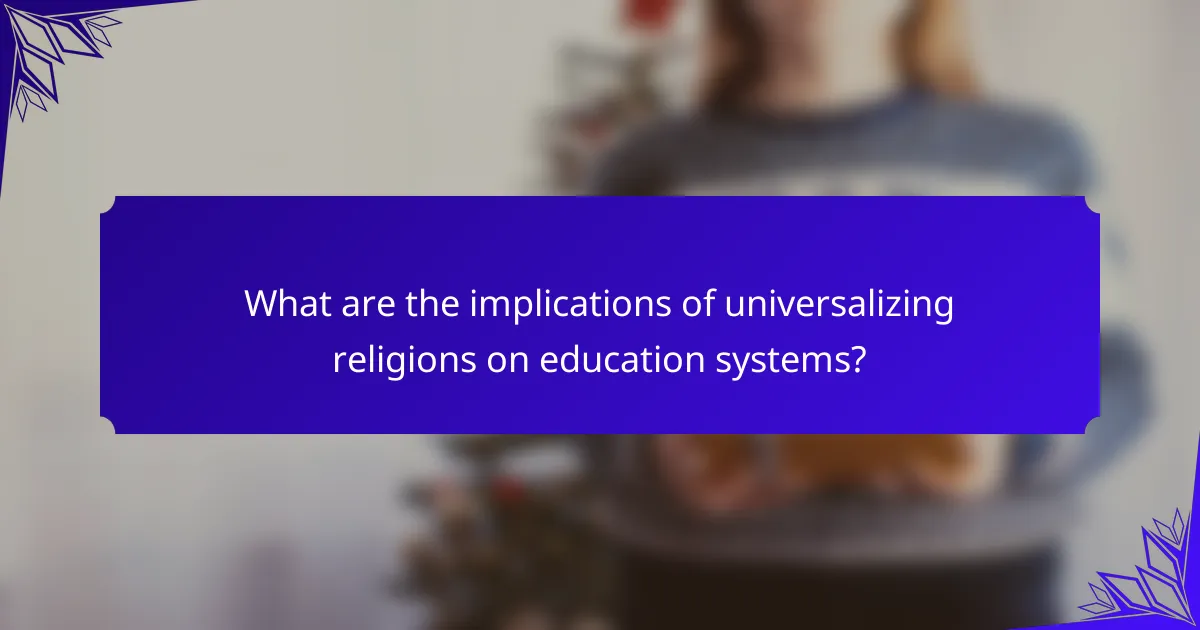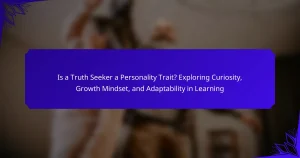Universalizing religions play a crucial role in shaping modern learning and global mindsets. They promote shared values, foster cultural conditioning, and enhance critical thinking in educational contexts. Their adaptability allows integration into diverse educational frameworks while emphasizing inclusivity and ethical teachings. This influence cultivates a broader worldview among learners, preparing them for interconnected societies.

How does universalizing religion influence modern learning?
Universalizing religions significantly influence modern learning by promoting shared values and global perspectives. They foster cultural conditioning that shapes educational systems, encouraging inclusivity and diversity.
These religions often emphasize moral teachings that enhance critical thinking and ethical reasoning in educational contexts. For example, many universalizing religions advocate for social justice, which can inspire curricula focused on equity and community service.
The global reach of universalizing religions facilitates cross-cultural exchange, enriching learning environments with diverse viewpoints. This exchange cultivates a global mindset among learners, preparing them for interconnected societies.
Lastly, the unique attribute of universalizing religions is their adaptability, allowing them to integrate with various educational frameworks while retaining core principles. This adaptability enhances their relevance in contemporary education.
What are the core principles of universalizing religions?
Universalizing religions aim to spread their beliefs globally, emphasizing inclusivity and cultural adaptation. Core principles include the belief in universal truth, the promotion of equality among all people, and the emphasis on personal transformation. These religions often adapt to diverse cultures, creating unique expressions while maintaining core tenets. Their global outreach fosters a sense of community among followers, transcending geographical and cultural boundaries.
In what ways do universalizing religions shape cultural conditioning?
Universalizing religions significantly influence cultural conditioning by promoting shared beliefs and values across diverse societies. They create a sense of global community, transcending local customs. For instance, the spread of Christianity and Islam has led to common moral frameworks and social norms, shaping education and governance. These religions often adapt local practices, leading to a unique synthesis that influences identity. As a result, universalizing religions not only provide spiritual guidance but also foster cultural cohesion and collective identity.
What role do rituals play in cultural conditioning?
Rituals play a crucial role in cultural conditioning by reinforcing shared beliefs and practices. They create a sense of community and identity among individuals, shaping their values and behaviors. Through repetition, rituals instill norms that guide social interactions and establish expectations within a culture. For example, religious ceremonies often serve to unify participants, promoting collective memory and continuity of traditions. These elements contribute to the broader understanding of universalizing religions in shaping modern learning and global mindsets.
How do teachings influence societal norms?
Teachings significantly influence societal norms by providing frameworks for values and behaviors. Universalizing religions shape modern learning by promoting shared ethical standards and cultural conditioning, which fosters global mindsets. For example, teachings on compassion and justice encourage social responsibility and community engagement. As a result, societies often reflect these values in laws and social practices. The unique attribute of universalizing religions is their ability to adapt and resonate across diverse cultures, creating a cohesive influence on global norms.

What are the unique attributes of universalizing religions?
Universalizing religions possess unique attributes that distinguish them from other belief systems. These attributes include a commitment to spreading their beliefs globally, an emphasis on inclusivity and acceptance of diverse cultures, and a structured approach to missionary work. Additionally, they often promote universal values such as compassion and justice, appealing to a broad audience. Their adaptability to various cultural contexts enhances their relevance and influence in shaping modern learning and global mindsets.
How do universalizing religions promote inclusivity?
Universalizing religions promote inclusivity by emphasizing universal values and shared beliefs. They often encourage dialogue among diverse groups, fostering understanding and acceptance. These religions, such as Christianity, Islam, and Buddhism, advocate for compassion and community, transcending cultural boundaries. Their global outreach initiatives aim to unite individuals, creating a sense of belonging among followers regardless of their backgrounds.
What are the distinctive learning methods within these religions?
Universalizing religions employ distinctive learning methods that promote global understanding and cultural integration. These methods include community-based education, sacred texts study, and experiential learning practices.
Community-based education emphasizes collective participation and shared experiences, fostering a sense of belonging. Sacred texts study involves in-depth analysis of religious scriptures, which helps individuals grasp core beliefs and values. Experiential learning practices, such as rituals and service projects, reinforce teachings through real-life applications.
These methods not only shape individual understanding but also influence broader cultural conditioning and global mindsets, aligning with the universalizing nature of these religions.

What rare traits distinguish certain universalizing religions?
Certain universalizing religions possess rare traits that enable them to adapt and thrive across diverse cultures. These traits include a strong emphasis on missionary work, which facilitates the spread of beliefs globally. Additionally, they often promote inclusivity, allowing for the integration of local customs and practices, thus enhancing cultural resonance. The ability to reinterpret sacred texts in various contexts further distinguishes these religions, making them relevant to a wide audience. Lastly, a focus on universal moral principles fosters a sense of shared humanity, appealing to individuals across different backgrounds.
How do specific texts influence learning and conditioning?
Specific texts significantly shape learning and conditioning by providing frameworks for understanding cultural norms and values. Universalizing religions, through their doctrines and narratives, create shared beliefs that influence educational systems and social behaviors. These texts often serve as tools for moral guidance, promoting community cohesion and shared identity. They condition learners to adopt specific worldviews, thus impacting global mindsets and cultural practices.
What impact do historical events have on the evolution of these religions?
Historical events significantly shape the evolution of universalizing religions by influencing beliefs, practices, and cultural integration. Major events such as wars, migrations, and social movements create shifts in religious understanding and community dynamics. For instance, the spread of Christianity during the Roman Empire established foundational doctrines that still resonate today. Similarly, the Enlightenment fostered critical thinking, impacting how religions adapt to modernity. These historical influences contribute to the ongoing dialogue between tradition and contemporary values within universalizing religions.

How do universalizing religions affect global mindsets?
Universalizing religions significantly influence global mindsets by promoting shared values and cultural norms. They foster a sense of unity and interconnectedness among diverse populations. This cultural conditioning shapes modern learning by integrating ethical teachings and community involvement into educational frameworks. As a result, individuals develop a broader worldview, embracing tolerance and understanding across different cultures. Unique attributes of universalizing religions, such as their missionary activities, further amplify their global impact, encouraging cross-cultural exchanges and dialogue.
What is the relationship between universalizing religions and globalization?
Universalizing religions significantly influence globalization by promoting shared beliefs and values across diverse cultures. These religions, such as Christianity, Islam, and Buddhism, facilitate cross-cultural exchanges and foster global interconnectedness. As a result, they shape modern learning and cultural conditioning, creating a global mindset that transcends local traditions. The spread of universalizing religions often leads to increased dialogue and understanding among different cultures, enhancing social cohesion. This relationship highlights how belief systems can drive cultural integration and influence global dynamics.
How do these religions foster intercultural dialogue?
Universalizing religions foster intercultural dialogue by promoting shared values and beliefs that transcend cultural boundaries. These religions emphasize inclusivity, encouraging followers to engage with diverse perspectives and traditions. For example, interfaith initiatives often arise from universalizing religious teachings, facilitating conversations that enhance mutual understanding. Such dialogue can lead to collaborative efforts on social issues, fostering peace and cooperation across different cultures.

What are the implications of universalizing religions on education systems?
Universalizing religions significantly influence education systems by promoting shared values and global perspectives. These religions often introduce moral frameworks that shape curricula and teaching methods.
One implication is the integration of ethical teachings into educational content, fostering a sense of community and responsibility among students. This approach encourages critical thinking about cultural differences and promotes tolerance.
Another impact involves the global reach of universalizing religions, which can lead to standardized educational practices across diverse regions. This standardization may enhance collaboration and understanding in a multicultural world.
Additionally, the emphasis on lifelong learning within these religions can inspire educational institutions to adapt and innovate, ensuring that learning remains relevant in a rapidly changing society.
How do universalizing religions shape curricula in various regions?
Universalizing religions significantly influence curricula by promoting shared values and global perspectives. They shape educational content to foster cultural understanding and social cohesion.
In regions with diverse populations, curricula often incorporate teachings from universalizing religions to address ethical issues and promote inclusivity. For example, in many Western countries, curricula include elements of Christianity, while in parts of Asia, Buddhism may be emphasized.
This integration not only enriches students’ knowledge but also prepares them for a globalized world. As a result, students develop critical thinking skills and a broader worldview, essential for navigating modern society.
Furthermore, universalizing religions often emphasize themes such as compassion, justice, and community service, which are increasingly reflected in educational programs worldwide. These themes encourage students to engage with their communities and understand their roles within a larger societal context.
What challenges do educators face when integrating religious perspectives?
Educators face significant challenges when integrating religious perspectives into modern learning. These challenges include balancing diverse beliefs within a multicultural classroom, addressing potential biases in curriculum content, and navigating legal constraints regarding religious expression in education.
Additionally, educators must foster open dialogue while ensuring respect for all viewpoints. They often encounter resistance from stakeholders who may oppose the inclusion of religious perspectives. Effective training and resources are essential for educators to manage these complexities and create an inclusive learning environment.

What best practices can enhance learning through universalizing religions?
Universalizing religions can enhance learning by promoting inclusivity, fostering critical thinking, and encouraging intercultural dialogue. These practices create environments where diverse perspectives are valued, leading to richer educational experiences.
One effective approach is integrating universalizing religious principles into curricula, which can provide ethical frameworks and encourage moral reasoning. For instance, discussing the concept of compassion found in many religions can inspire empathy among students.
Another best practice is facilitating interfaith dialogues, allowing learners to explore different beliefs and practices. This exposure can challenge biases and broaden worldviews, essential for developing global mindsets.
Additionally, incorporating service-learning projects that reflect universalizing religious values can connect theoretical knowledge with real-world applications. Engaging in community service fosters a sense of responsibility and enhances social awareness among learners.
How can individuals apply religious principles to modern learning environments?
Individuals can apply religious principles to modern learning environments by integrating values such as respect, empathy, and community. These principles foster a collaborative atmosphere conducive to learning.
Additionally, incorporating diverse religious perspectives can enhance critical thinking and cultural awareness among students. This approach encourages open dialogue and promotes inclusivity, preparing learners for a globalized society.
Moreover, utilizing service-oriented teachings from various religions can inspire students to engage in community service projects. This practical application of beliefs cultivates a sense of responsibility and social consciousness.
Finally, religious principles can guide ethical decision-making in education, helping students navigate moral dilemmas and develop integrity in their academic and personal lives.
What common mistakes should be avoided in religious-based education?
Avoiding common mistakes in religious-based education is crucial for fostering understanding and respect. Key mistakes include generalizing beliefs, neglecting diverse perspectives, and failing to engage critical thinking.
Generalizing beliefs can lead to misconceptions about a faith’s tenets. Neglecting diverse perspectives results in a narrow understanding of religion’s role in culture. Failing to engage critical thinking inhibits students from questioning and exploring religious concepts deeply.
By addressing these issues, educators can create a more inclusive and enriching learning environment that respects the complexity of religious beliefs.
What strategies can be used to respect diverse beliefs in learning?
To respect diverse beliefs in learning, educators can implement inclusive strategies. These include fostering open dialogue, integrating multiple perspectives, and promoting cultural sensitivity. Encouraging collaboration among students from different backgrounds enhances mutual respect and understanding. Additionally, adapting teaching materials to reflect diverse beliefs can create a more inclusive learning environment.


